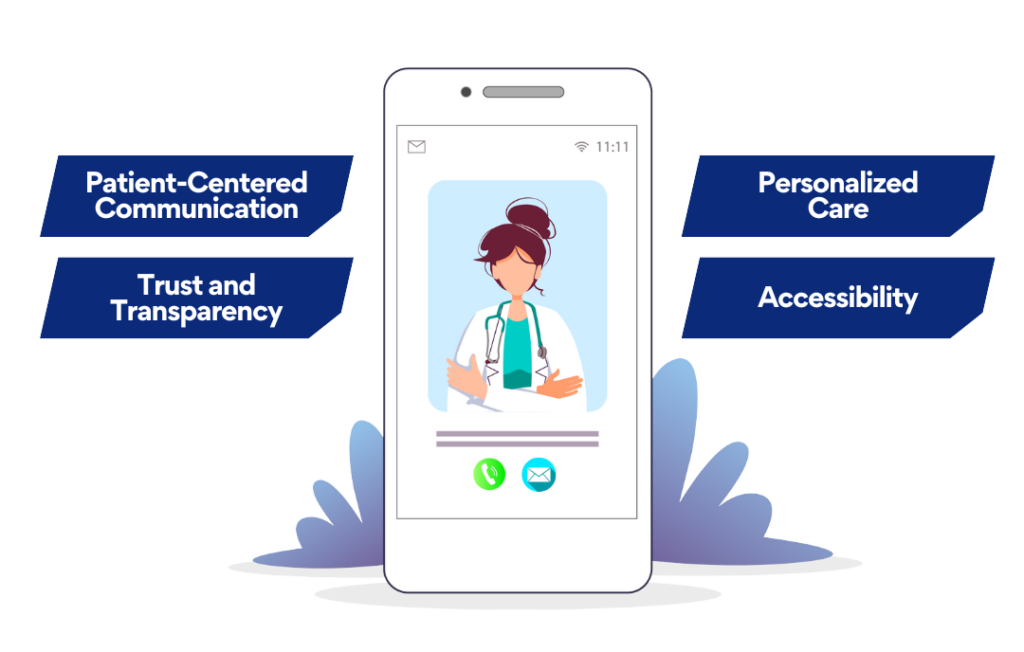In recent time, building strong and trustworthy customer relations in healthcare with patients is paramount. Effective communication is the foundation of these relationships, ensuring that patients feel heard, understood, and valued. As healthcare continues to evolve, so does the way providers interact with their patients. One of the most powerful tools in this evolution is CRM Messaging. This technology can transform the way providers manage and improve their customer relations in healthcare, leading to better patient outcomes and satisfaction.
In this blog, we will explore how CRM Messaging can enhance customer relations in healthcare, offering a more personalized and efficient approach to patient communication.
The Importance of Strong Customer Relations in Healthcare
Healthcare is a service-oriented industry where the quality of customer relations directly impacts patient satisfaction and loyalty.
Positive interactions with healthcare providers can lead to better patient adherence to treatment plans, increased trust, and a higher likelihood of patients recommending the provider to others.
Key Aspects of Customer Relations in Healthcare:

- Patient-Centered Communication: Patients expect clear, timely, and empathetic communication from their healthcare providers.
- Personalized Care: Tailoring interactions and treatments to the individual needs of patients fosters a sense of importance and care.
- Trust and Transparency: Open communication builds trust, which is crucial in healthcare where decisions can significantly impact a patient’s well-being.
- Accessibility: Patients should have easy access to their healthcare providers for questions, appointments, and follow-ups.
How CRM Messaging Improves Customer Relations in Healthcare
CRM Messaging offers healthcare providers a robust platform to manage and enhance their interactions with patients. Here’s how:
1. Streamlined Communication
CRM Messaging allows healthcare providers to centralize all patient communications in one platform. Whether it’s appointment reminders, follow-up messages, or critical health updates, everything can be managed efficiently. This reduces the chances of miscommunication and ensures that patients receive the information they need when they need it.
2. Personalization of Patient Interactions
With CRM Messaging, healthcare providers can personalize their communications based on patient history, preferences, and needs. For example, a patient with a chronic condition might receive tailored reminders about medication or lifestyle tips relevant to their health. Personalized communication not only improves patient satisfaction but also enhances treatment adherence.
3. Automated Messaging for Better Efficiency
Automation is a powerful feature of CRM Messaging that can save time for both healthcare providers and patients. Automated appointment reminders, test result notifications, and prescription refill alerts ensure that patients stay informed without the need for constant manual input from staff. This leads to higher operational efficiency and better patient engagement.
4. Enhanced Patient Support
CRM Messaging enables healthcare providers to offer better support by providing multiple channels for patients to reach out. Whether through SMS, email, or live chat, patients can choose the method that best suits them, ensuring they always have a way to get the help they need.
5. Building Trust Through Consistent Communication
Regular and consistent communication is key to building trust in the healthcare provider-patient relationship. CRM Messaging ensures that patients are regularly updated about their health, appointments, and any changes to their care plans. This transparency reassures patients that their provider is attentive and invested in their well-being.
6. Data-Driven Insights
CRM Messaging platforms often include analytics features that provide insights into patient interactions. Healthcare providers can use this data to identify trends, patient preferences, and areas for improvement in their communication strategies. For instance, if patients frequently miss appointments, providers can adjust their reminder schedules or methods.
Conclusion
In recent time, strong customer relations in healthcare are not just beneficial—they are essential. CRM Messaging offers a comprehensive solution for healthcare providers looking to enhance their communication with patients, leading to better satisfaction, trust, and health outcomes.
By implementing CRM Messaging, healthcare providers can streamline their communications, personalize patient interactions, and build lasting, trust-based relationships that ultimately contribute to better care.
Ready to elevate your patient relations? Contact CRM Messaging to learn how we can help you implement a CRM Messaging strategy that meets the unique needs of your healthcare practice. Book a free demo with our experts now!






